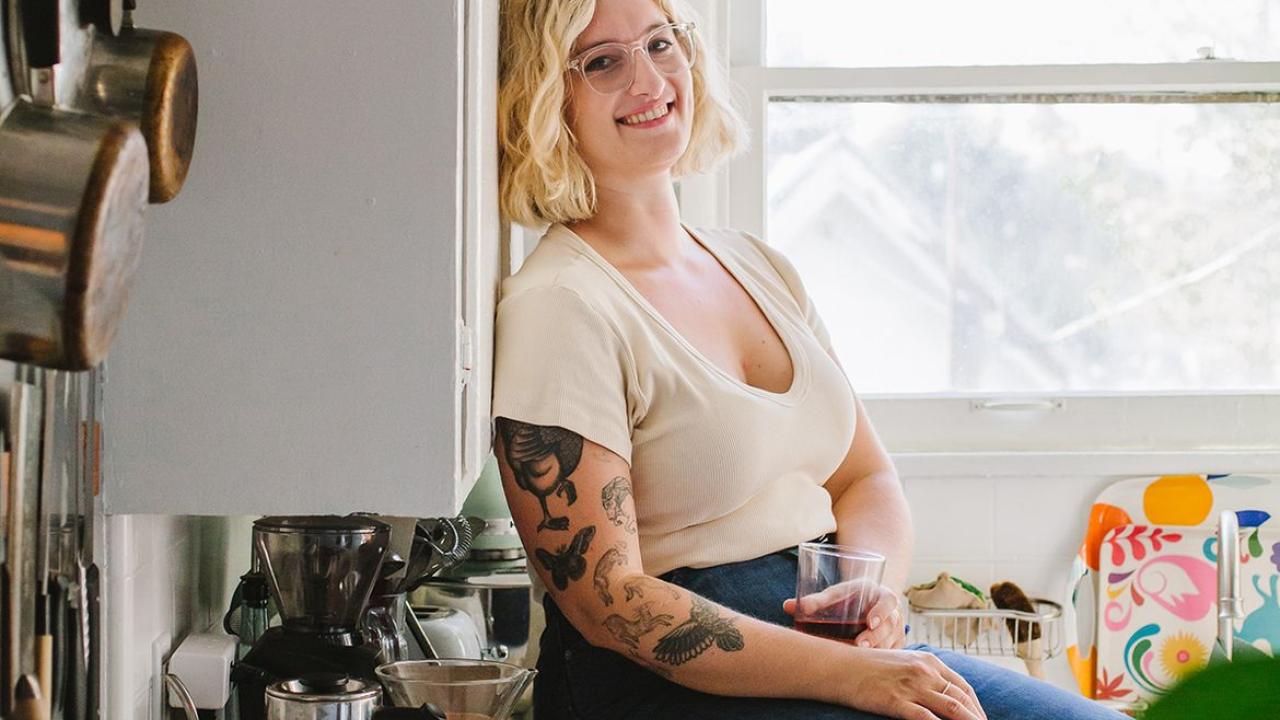In Elizabeth Schiffler’s childhood home in Seattle, gathering around food and being well-fed were considered family values; it was a sense of warmth, caring, nurturing and security that she carried with her as an undergraduate theater student at the University of Washington.
“I would get bagels for everyone in the morning to make sure that people didn’t start rehearsal hungry,” she recalled. “[After rehearsal], we would do meals together. In the same way that theater makes us commune, food makes us commune as well.”
Now a doctoral student in Theater and Performance Studies at the UCLA School of Theater, Film and Television, Schiffler is blending her love for food and performance by spending her days thinking about the role of storytelling in food equity, sustainability and systems thinking. Her efforts are not going unnoticed.
Schiffler, a grant recipient of the UCLA Sustainable LA Grand Challenge Equity, Diversity & Inclusion Fellowship Program, has been partnered with the new Los Angeles County Food Equity Roundtable to execute the broader plan around her winning proposal. “Imagine Dinner” is an artistic cookbook that instructs educators and nonprofit programmers to create an immersive performance art dining experience. It features recovered food in mouthwatering recipes created by three L.A.-based chefs who put creativity and storytelling at the forefront of their work.
While the term “recovered food” most often refers to the ways in which nonprofits glean and redistribute food to pantries and community kitchens — and can sometimes conjure images of intrepid souls dumpster diving behind grocery stores to grab discarded but still edible fare — Schiffler’s focus on the work of chefs presents another perspective.
‘Saving and savoring’
“My goal in making this cookbook is to highlight how local chefs, especially with small restaurants or independently run businesses, are always thinking about saving food, making ingredients last, and appreciating all of the produce and elements of a meal from source to bite,” she said. “The logic that food is not to be wasted is still central … local culinary artists are additionally a key source for knowledge about saving and savoring food.”
Chef Martin Draluck, who has been featured on Netflix’s “High on the Hog,” uses story and history “to think about how we can have a new relationship with our food,” Schiffler said. In “Imagine Dinner,” he is offering “A History of Macaroni & Cheese Casserole.” Minh Phan, the force behind Porridge + Puffs and Phenakite, which the Los Angeles Times named Best Restaurant of the Year in 2021, has always centered recovered food in her work. An expert at pickling unused vegetables at her establishments, she’s creating “A Pickle in Time.” Camila Casanas, an emerging wholistic chef who thinks about food as medicine, is fashioning “Anatomy of a Perfect Meal.”
The cookbook will also contain a foreword by chef Evan Kleiman, host of KCRW’s “Good Food”; an interactive prompt to encourage readers “to imagine their own dinner, food heritage, and dreams for a delicious meal”; and a resource list of L.A. County Food organizations, nonprofits, community centers, artists and other components of L.A.'s food culture.
As Schiffler explores how “Imagine Dinner” can scale to countywide and national initiatives, the Los Angeles Unified School District and Common Threads, a national nonprofit that is working with LAUSD as part of its California Farm to School Program, have become key partners in how this project will affect young adults and culinary professionals beyond UCLA’s campus.
A different kind of dinner performance
But that’s not all. On April 18, there will be a cooking and dining experience — a “performance dinner” — hosted by the UCLA Teaching Kitchen, with 12 undergraduate students participating in the creation (and eating) of the meals, led by Schiffler and Teaching Kitchen Chef Julia Rhoton.
“[We will be] thinking about the entire dining environment to create an imaginative, sustainable and healthy dinner for undergraduate participants,” Schiffler said. “Cooking and eating are always on the fine line of performing; we both perform the rituals of the kitchen and the table. Students are both artists and audiences as they make a recipe to eat with each other.”
In the coming academic year, she will begin the second phase of her project in collaboration with Michelle Liu Carriger, the chair of Schiffler’s dissertation committee. The project, which will utilize the artistic and traditional cultural practice of the Japanese tea ceremony to highlight the contemporary environmental challenges of ocean plastic pollution, post-3/11 radiation and transnational cultural exchange, will also include a second cookbook, “Imagine Tea.”
When thinking about life post-graduation, Schiffler says she plans to continue her pursuit of her twofold interests.
“The dream would be to stay in Los Angeles and work at a university, a cross appointment between a performance or media department and the food studies department,” she said. “But I would love to stay in a job that lets me do this type of public engagement as well.”
Schiffler’s “Imagine Dinner” project also has the support of the Semel Healthy Campus Initiative, UCOP’s Global Food Initiative and the TFT Dean’s Vision Fund.
Image Source: Marielle Chua
Article by Noela Hueso
Also on UCLA Newsroom.





